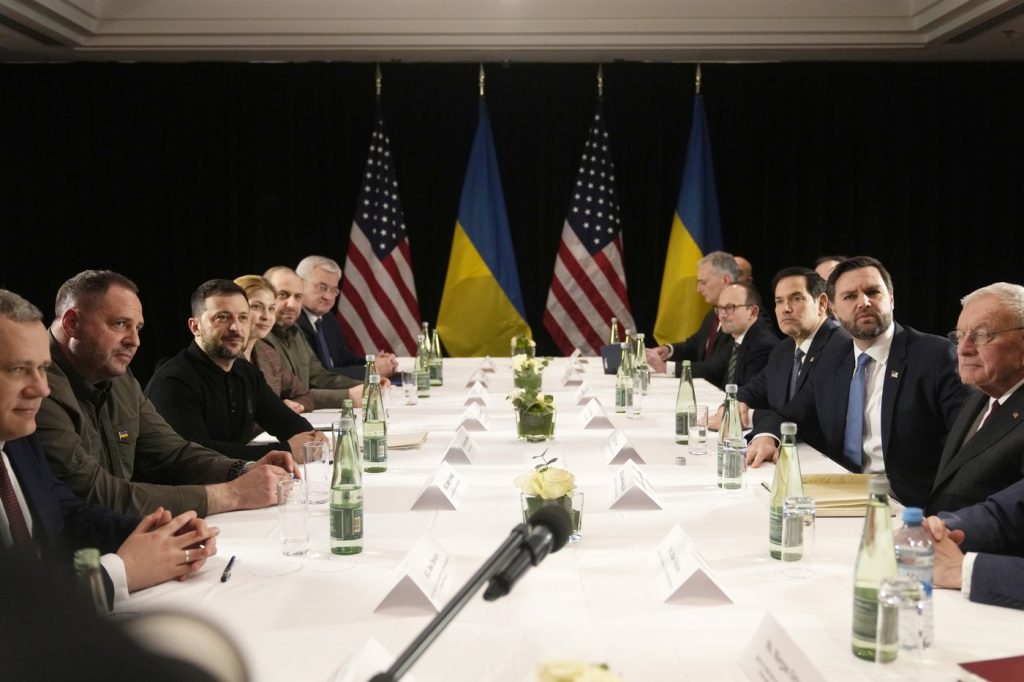MUNICH, Germany (AP) – Ukrainian President Volodymyr Zelenskyy has publicly stated that he instructed his ministers not to approve a proposed agreement granting the United States access to Ukraine’s rare earth minerals. This decision stems from concerns that the agreement overly prioritized U.S. interests without providing adequate security guarantees for Ukraine.
The proposal emerged during Zelenskyy's discussions with U.S. Vice President JD Vance at the Munich Security Conference held on February 14, 2025. According to sources, the agreement did not include any specific assurances of security in exchange for U.S. access to these valuable resources, which are crucial for industries such as aerospace, defense, and nuclear power.
Zelenskyy expressed his reservations, remarking, “I didn’t let the ministers sign a relevant agreement because in my view it is not ready to protect us, our interest.” The proposed agreement suggested that the U.S. could utilize Ukraine's rare earth minerals as recompense for military support previously provided by the Biden administration, as well as future aid. Senior Ukrainian officials noted that any exploitation of these resources must be linked to security guarantees that would shield Ukraine from further Russian aggression.
The significance of Ukraine’s vast reserves of critical minerals cannot be understated, especially given ongoing geopolitical tensions. The Trump administration has indicated interest in tapping into these resources to lessen dependence on China. However, Zelenskyy emphasized that any such arrangements would need to prioritize Ukraine's security. “For me, it is very important the connection between some kind of security guarantees and some kind of investment,” he stated.
Zelenskyy did not elaborate on the precise reasons for his decision to refrain from signing the agreement, which had been presented to Ukrainian officials by U.S. Treasury Secretary Scott Bassent a few days prior to the conference. One former senior official described the proposal as reflective of a colonial attitude, indicating a reluctance to accept terms perceived as unfavorable.
Brian Hughes, spokesman for the White House National Security Council, criticized Zelenskyy’s choice as “short-sighted,” suggesting that the minerals deal could be an opportunity for Ukraine to bolster its economy and provide American taxpayers a means to recover funds sent in aid. Hughes asserted that establishing strong economic ties with the U.S. would serve as a vital deterrent against potential aggression while contributing to enduring peace.
During discussions in Munich, U.S. officials focused primarily on commercial aspects and strategies for exploring these mineral deposits without addressing security issues tied to ongoing Russian hostilities. Concerns regarding the protection of extraction operations were noted, emphasizing that the U.S. had “no ready answers” for safeguarding these ventures amidst heightened military tensions.
In line with Ukrainian legislation, any agreement would need to align with local laws and garner public support, as highlighted by Kseniiia Orynchak, founder of the National Association of Mining Industry of Ukraine. She reiterated that under Ukrainian law, mineral resources belong to the Ukrainian people, underscoring the necessity for a deal to reflect popular consensus.
Despite not delving into the specifics of the deal during their meetings, both Zelenskyy and Vance had constructive discussions, with Vance emphasizing a commitment to achieving a durable peace. Zelenskyy reiterated the importance of Ukraine maintaining a robust negotiating position in future discussions, emphasizing that the United States should engage directly with Ukraine concerning negotiations with Russia.
Furthermore, General Keith Kellogg, appointed special envoy by Trump, suggested a more exclusive negotiating table that sidelined European involvement, contradicting Zelenskyy’s request for a more inclusive discussion format.
As Ukraine prepares a counter proposal to present to the U.S., the implications of this ongoing dialogue signal intricate layers of geopolitics, economic strategy, and national security that continue to shape relations between Ukraine and its allies.










